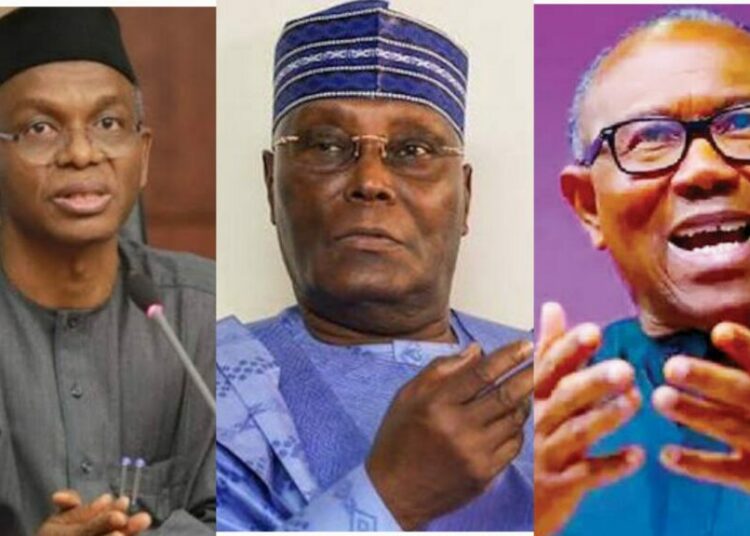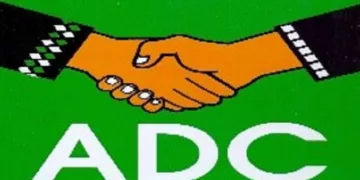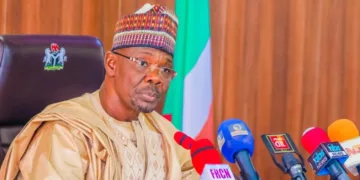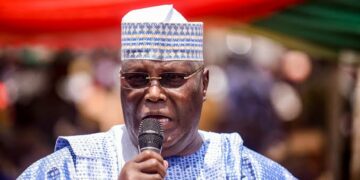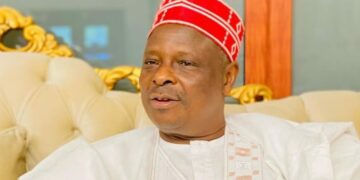Stakeholders, including scholars and Civil Society Organisations (CSOs), have expressed divergent views over the viability of the National (opposition) Coalition, plotting the removal of the President Bola Tinubu-led government of the All Progressives Congress (APC).
While others opined that the coalition may not succeed because of the gladiators’ selfish tendencies, some said the movement should not be dismissed pending the political dynamics that would play out ahead of the 2027 general election.
A lecturer in the Political Science Department, Federal University of Kashere, Gombe State, Dr Terna Vincent Tavershima, said he did not see the coalition working because of the selfish interests of the political gladiators.
He said, “Atiku Abuabakar, for instance, will not want to give up his presidential ambition. Peter Obi, too, having seen his strength in the last election, will not want to give up his presidential ambition. I don’t know of El-Rufai and Kwankwaso.”
The scholar maintained that, “if this coalition is to work ahead of 2027, it means that these four notable gladiators, three will step for one. It is only when that happens that the coalition will work.
“Those running the coalition, they are hopeful because they’re Nigerians and they are hopeful that the coalition will work but some of us that are political observers, we are skeptical but let us wait until towards the end of 2026 if the coalition is to work, we will then know but for now it is still early days and the political gladiators are talking to themselves which is healthy for democracy.”
“Like I said, let’s wait until 2026, towards the end, and let’s see if these gladiators will step down for just one person because that is the only way that this coalition can work and the only way that they can defeat President Bola Tinubu in 2027. If all of them gun for the presidency, President Tinubu will have a smooth ride for his second term.
“But if these four political gladiators subsumed their interests and ask one person to go for the position and for me, the person should be a southerner so that the votes in the North – the Atikus, the Kwankwasos, the El-Rufais and whoever will have to bring the votes from the north for that southern candidate and the southern candidate will have to slug it out with Tinubu in the south and break the votes there. That is the only way the coalition can defeat President Tinubu in 2027.”
The political scientist noted that “what happened in 2015 was not a coalition; it was a merger. Political parties dissolved their structures and then formed another political party, which led to the defeat of President Goodluck Jonathan in 2015.
“This one going on now which is called coalition is that the parties will not be dissolved into one political but what they will have to do is to present one presidential candidate so that all the political faithful will have to vote for that presidential candidate on his own political platform.
“What happened in 2015 was a merger that brought about APC. This one that is about to happen in 2027 is a coalition where all the structures of the political parties will remain, but one presidential candidate will be chosen, where all the other political parties will vote for that particular presidential candidate.”
For Dr Christian Okeke, a political science lecturer at the Nnamdi Azikiwe University Awka, Nigerians who care have many reasons to watch the budding opposition coalition ahead of the 2027 general elections.
“Let’s not forget in a hurry that such moves in 2013 eventually handed political power to the APC in 2015, and the party has, against all odds, clung to power till date.
“Besides, I believe that given the character of an average Nigerian politician, many partymen who will lose out in the power struggle around 2027 will jump ship and may likely land onto the laps of the coalition’s party,” he said.
Okeke argued that anyone writing off this move may be making mistakes and is not a good student of history.
“Victories of opposition forces in some foreign countries are enough to assuage naysayers. For instance, Namibia’s opposition was less well-organised but eventually ended the reign of the South West Africa People’s Organisation.
“Also, Mauritius’ opposition succeeded in capitalising on their government’s high-handedness and monumental corruption to end the administration of Pravind Kumar Jugnauth. Such was the case in Senegal recently when President Macky Sall was sent out of power by Bassirou Faye
“As we speak, opposition leader Lee Jae-myung has been sworn in as South Korea’s president. The same is the story in Greenland, where the opposition also won to the surprise of many.
“The list can go on and on, but a major take is that the political ecology of Nigeria could be unpredictable, and the politicians pushing the coalition cannot be written off after all.
“They were part of the 2015 surprise, and the tide may turn in their favour again. Time shall tell if their foresight will end in vain, but it is something that cannot be wished away,” he added.
Two prominent CSOs, Transparency International (TI), the Civil Society Legislative Advocacy Centre (CISLAC) and the Transition Monitoring Group (TMG), said that due to the absence of a single viable opposition political party, the coalition is a threat to the ruling APC.
The leader of the CSOs, Awwal Musa Rafsanjani, in an interview with LEADERSHIP, said that if the coalition continues with its consultations and the ruling party continues to ambush and put Nigerians in more hardship, it will definitely make a huge difference.
“Given the absence of a constructive political party in the country, this coalition or association of politicians certainly is a threat to the ruling party because no party is able to challenge the ruling party.
“As a matter of fact, the ruling party has been able to infiltrate the opposition political parties even in the legislature. So, to come up with any platform that will create political uncertainty for the ruling party control and manipulation and dictatorship, I think it is something that we can not stay away from the potential it (coalition) has if it continues with the consultations and if the ruling party continues to ambush and put Nigerians in more hardship.
“Certainly, it will definitely make a huge difference if Nigerians continue to experience unfulfilled promises, deception, lies and untold hardship from the policies and programmes of the ruling party. So, surely, this coalition or association of politicians will be a big threat to the ruling party,” he noted.
In the same vein, the advocacy officer, West Africa Democracy Solidarity Network (WADEMOS Network), Austin Aigbe, said that rather than Nigerians believing, the government of the day should be wary of the opposition coalition because it came to power through a kind of situation that is almost happening now.
Aigbe likened the ongoing coalition to the merger of other political parties, which formed the APC and wrestled power from the PDP-led government of former President Goodluck Jonathan in 2015.
“This time in the Nigerian political system is just like we are back to the 2015 presidential election that led to the first-ever defeat of an incumbent government based on an opposition coalition in Nigeria’s history. Recall then that the PDP broke into two, the n-PDP and the conventional one or the old-PDP, as it were. Then, there was a section of ANPP, a section of APGA, and, of course, the ACN at that time, which led to the merger of APC.
“You will recall that only through that process was the opposition coalition of 2014 able to wrestle power in 2015. The whole idea is that, based on the fragmentations of these opposition parties, they are not able to withstand a major political party, as of this time, the APC. The APC is at the threshold just like the PDP in 2014.
“In fact, it is almost like the same thing; the difference is the personality of the president at that time. Goodluck Jonathan has his personality, and of course, President Bola Tinubu has a different personality. But the atmosphere looks very the same, and I can say that where we are headed to the 2027 general election will be realignment, and the realignment may end up in an opposition coalition.
“As of this time, many believe Nigeria is headed towards a one-party state, even though we have also seen that before in 2014. If you want to win the election around 2014, you must belong to the PDP. By the time this happened, PDP started to experience internal upheaval that led to a situation where many who didn’t get a ticket in PDP got angry and went out.
“Now, what is going to happen in Delta state? What is going to happen in Akwa Ibom State? What will happen in all the states where all senators and House of Representatives members are decamping? What is going to happen in Edo State? Even though the governor is from the APC, the House of Assembly members are from the PDP and have left the PDP for the APC. So, it looks like a resemblance of what happened before. It doesn’t look new at all.
“Not that Nigerians should believe the opposition coalition, I think the government of the day needs to be very wary of this opposition because they came to power through a kind of coalition that is almost happening now, even though it may not get registration as a political party because of other dynamics. Nigerians should think that what happened in 2014 may happen in 2026 ahead of the 2027 election,” he added.
A key member of the coalition and former national vice chairman (North-West) of the ruling All Progressives Congress (APC), Salihu Lukman, recently said the coalition is committed to addressing issues such as internal democracy differently, which must be made clear from the outset.
According to him, the opposition coalition must reject automatic tickets for any candidate, including the president, governors, or lawmakers, in the 2027 general elections.
“Neither the president, governors, nor lawmakers should be granted automatic tickets or endorsements.
While President Buhari benefited from an automatic ticket during his second term, the fact that it happened in the past does not make it right. If a mistake was made, we must acknowledge it as such.”
“Our commitment is to approach these challenges differently, and this must be made clear from the outset. When we talk about moving forward, we envision a political party that breaks away from the traditional model where candidates are chosen based on cultural or entrenched positions, and once elected, remain unaccountable,” he said.


